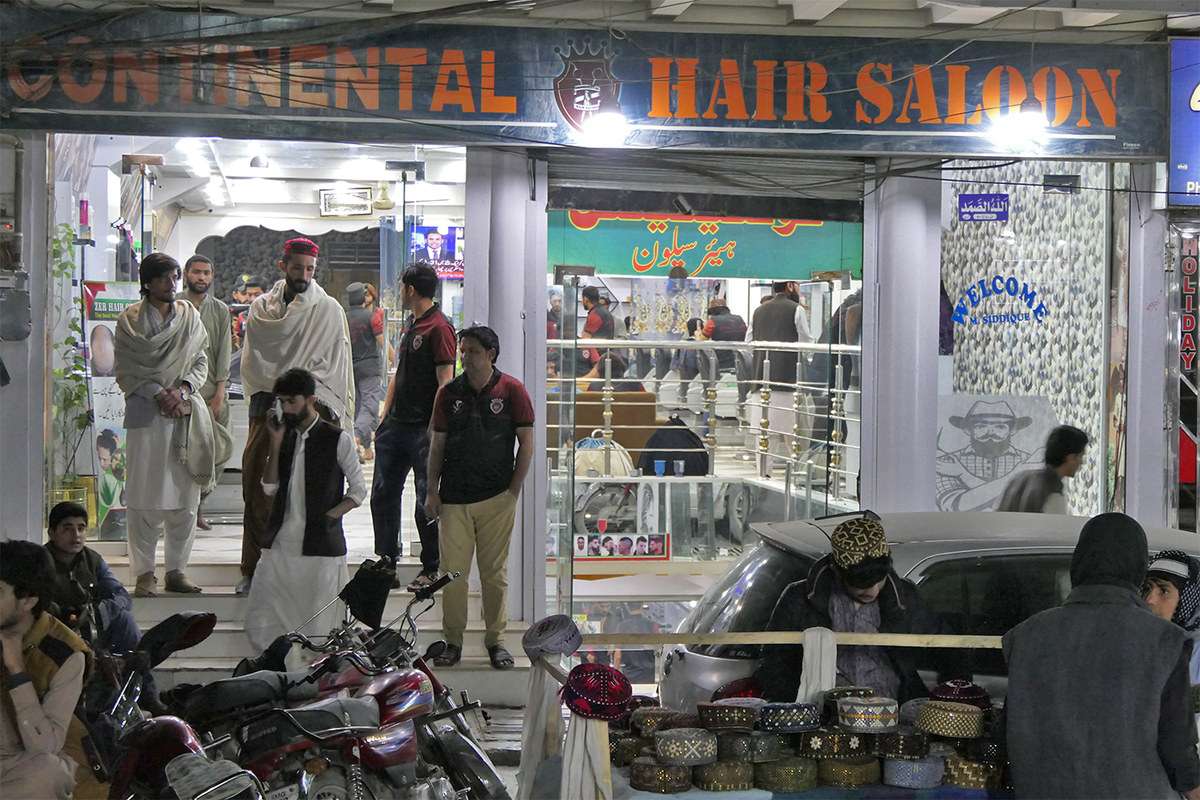QUETTA: Need a haircut before Eid? Want to get your beard trimmed? Or looking for a break from hectic Eid preparations with a calming facial?
Prince Road is the place to visit if you require men’s grooming services on any day of the year, but especially ahead of the Eid holiday in Quetta, the provincial capital of the southwestern Pakistani province of Balochistan.
A few days before Eid this week, crowds of men, young and old, arrived at the brightly lit street to visit their favorite salons as barbers and stylists worked frantically to keep up with the holiday rush.
All types of vendors will be at your service on Prince Road: from salons that employ dozens of staffers to street barbers that set up their shops on footpaths and don’t have much at their disposal except their tools, a chair, mirrors, and impressive skills.
Muhammad Siddique, who owns the largest men’s salon on Prince Road and has more than 50 staffers, said his employees worked day and night starting a week before Eid to groom customers at the Continental Hair Salon.
Almost every customer wished for a “fresh, unique look” to match new Eid outfits, according to the 60-year-old salon owner.
“We are providing shave, haircut, beard-trimming, facial massages and hair-straightening services to our customers, but the demand for facial services increases during the Eid season,” Siddique told Arab News this week.

People wait outside a hair salon in Quetta, Pakistan, on April 8, 2024. (AN photo)
And which were the popular haircuts this Eid?
“Customers have been asking for straight, rough and puff hairstyles, because everyone wants to look handsome for Eid,” said Siddique, an experienced barber for the last 40 years who said his salon offered “very reasonable” rates for all services to cater to customers from across Balochistan, Pakistan’s largest but most impoverished province.
“We charge Rs500 ($1.80) for a simple haircut and beard-trimming, but for facial massages there are different rates, ranging from Rs2,000 ($7) to Rs10,000 rupees ($36).”
“BALOCHISTAN CATCHING UP ON NEW TRENDS”
Balochistan is home to 10.48 million people mainly from the ethnic Baloch and Pashtun tribes, famous for their elaborate cultural attires and grooming techniques, with salon owners and stylists on Prince Road saying the clients’ urge to try new styles on Eid knew no bounds.
“We travel outside of Quetta for picnics with friends during Eid vacations, record TikTok videos and take pictures for social media. Because of this we take extra care about how we look on Eid,” said Munir Ahmed, a 26-year-old mechanic who works on Quetta’s Sabzal Road and was visiting a men’s salon to get his hair and beard trimmed ahead of Eid.
“There are dozens of men salons in Quetta but on this street, there are so many professional barbers,” Ahmed added. “In the last week of Ramadan, we visit the market for Eid shopping and get haircuts after the iftar [fast-breaking sunset] dinner and you will find people standing in queues outside barber shops all the way till suhoor [sunrise meal].”

A barber tends to a customer at a salon on Quetta's Prince Road, Pakistan on April 8, 2024. (AN photo)
Thirty-eight-year-old Syed Shahzada, who was getting his long hair trimmed at a salon on Prince Road, said the people of Balochistan were becoming more conscious of how they looked and following trends from the relatively prosperous Punjab and Sindh provinces.
“In Quetta, males have even left females behind, who used to be famous for visiting beauty parlors during the Eid season,” Shahzada told Arab News. “People like me, with long hair, we visit salons twice in Ramadan, but for a facial massage, I will come here again on Chand Raat [night before Eid].”
Siddique agreed that fashion trends were catching on even in remote parts of the province, saying his salon was visited by tribesmen from far-off districts like Chaman, Pishin, Mastung, Kalat and Khuzdar.
“More than 400 customers daily visit our shop during the last 10 days of Ramadan,” the barber said as he chatted with incoming clients.
“That’s why we provide 24-hour services to cover the rush.”















